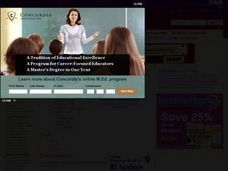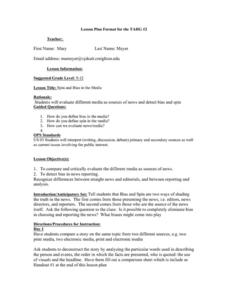PBS
Does Art Imitate Life?
Write what you know, sound advice for any writer and something many famous authors are known to have done. Use these materials to explore how Shakespeare's life influenced his plays. This resource is packed with readings, video segments,...
Clever Student Training Company
Logical Fallacies Recognition
“Should same-sex marriage be allowed?” As part of a study of recognizing logical fallacies learners read John Stemberger’s April 12, 2012 argument against same-sex marriage published on the opinion page of the Orlando Sentinel. They then...
Curated OER
Children's Media and Censorship
High schoolers form opinions about children and television censorship after analyzing literature. They complete a journal writing activity to identify the topic and make a list of inappropriate television shows for children. Next, they...
iCivics
Yeah, But...
Impress upon your young learners the importance of formulating counter arguments based on facts and not opinions. This resource is meant to strengthen arguments designed in a previous lesson, but could also be used as a stand-alone...
Curated OER
Why Do I Want All This Stuff?
Students identify two factors that determine consumer demand as well as substitutes and complements for selected goods and services. After examining advertisements, they distinguish between fact and opinion and explore the factors that...
Curated OER
The Diary of Col. William Fairfax Gray
Fourth graders examine facts and opinions given by William Fairfax Gray in his diary, compare and contrast ideas expressed in his diary, express opinions using correct language arts skills, and calculate answers to given mathematical...
Curated OER
The Vaccination Question
Students share opinions about common vaccines, then consider facts and opinions about the HPV vaccine and hold a fishbowl and discussion. They survey members of the community to determine their perspectives on the issue.
Curated OER
Osage, Legend, and Arkansas History
Elementary schoolers evaluate the legend of Norristown Mountain by looking at facts about the Osage Indians and the legend itself. They do an exploration of Arkansas' Native American groups which includes a look at their legends,...
Curated OER
Descriptive Persuasive Texts
In this Language Arts worksheet, students read about persuasive writing. Students read an example and complete a chart that organizes the information into facts and opinions.
Curated OER
Language Review #7
In this language review #7 worksheet, students edit and punctuate 3 sentences, write fact or opinion for 2 sentences, select words that are spelled correctly and write synonyms for 2 words.
Curated OER
What's In the Shopping Bag?
Learners explore the techniques used by advertisers to sell toys and snack foods, increase awareness of consumer habits and media influences and differentiate between information and selling.
Curated OER
The Atomic Bomb Dilemma
Students examine consequences of using atomic bomb in light of resulting peace, distinguish between fact and opinion and analyze sources to recognize bias and points of view, and assume role of reporter, critic, cabinet member, or...
Curated OER
Up, Up, and Away
Middle schoolers research hot-ballooning using Internet resources including an around-the-world balloon flight. They determine fact from opinion, examine point of view, and determine main idea, and details. They write a journal entry...
Curated OER
Getting to Know the Candidates: Analyzing Their Campaign Ads
Pupils examine the role of advertising in presidential campaigns. They analyze one candidate's advertising campaign ads for elements such as major issues, positivity, negativity, facts, and opinions.
Curated OER
Goggle Eyes
In this Google Eyes worksheet, students read eight chapters from Google Eyes and then complete a comprehension exercise, speech marks, persuasive writing, fact and opinion, question mark, and the comma worksheets. Students answer one...
Curated OER
Conducting Research
Third graders conduct research. In this conducting research lesson plan, 3rd graders discuss the importance of nonfiction text in providing factual information. Students write questions about an assigned topic and research using...
Museum of Tolerance
Developing Media Literacy
To protect young people from questionable content, many schools limit access. This resource suggests that because learners can so readily avail themselves to unrestricted Internet access, it is vital for 21st century learners to develop...
Facing History and Ourselves
Free Press Makes Democracy Work
A unit study of the importance of a free press in a democracy begins with class members listening to a podcast featuring two journalists, one from a United States public radio station and one from Capetown, South Africa. The lesson plan,...
Curated OER
Spin and Bias in the Media
Students compare different types of media. In this media comparison lesson, students will assess the where all types of media gets its information by viewing a video of a news story and critiquing it.
Curated OER
bbc news: school report
In this journalism worksheet, students choose a subject for a news report. They create a list of three people they would like to interview. They write 3 questions to ask, and indicate if the question relates to a fact or opinion.
Curated OER
Observation
Students study the different kinds of observation: fact and opinion. For this observation lesson students complete an activity that allows them to use their senses to make observations.
Curated OER
HOT TOPICS OF THE MISSISSIPPI
Students use a five-step process to write a persuasive essay about an issue that is related to the Mississippi River. Students build an argument based on prior knowledge and information from a variety of sources. Students base their...
Pennsylvania Department of Education
Stories? Information? What's the Difference?
Students listen to a power point presentation to distinguish between fiction and nonfiction text. In this what's the difference lesson, students identify fact from opinion within a text. Students listen critically and respond to text.
Curated OER
Family Life
What is family? Challenge your scholars to write an encompassing definition of what this word means to them. After reading "It May Be a Family Matter, But Just Try to Define Family," class members discuss the emotional issues surrounding...
Other popular searches
- Fact Opinion Lesson Plans
- Fact and Opinion Passages
- Fact Opinion Worksheet
- Fact and Opinion Lessons
- Teaching Fact vs. Opinion
- Fact and Opinion Worksheets
- Teaching Fact and Opinion
- Fact and Opinion Games
- Reading Fact and Opinion
- Fact and Opinion Keywords
- Identifying Fact or Opinion
- Fact Opinion Quiz

























